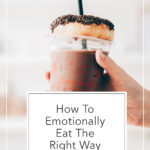
If you’ve ever tried fasting, you know food brings with it an emotional component. Sure, there is a biological need, but more than your stomach growling, we tend to run to food for some unspoken emotional reasons.
I know we don’t like to believe it, and we wish it wasn’t so, but food is emotional. We could argue everything in life carries with it some kind of emotion. The emotion determines how we react to the world around us, which determines how our body processes what is happening and prepares for it.
Making food another thing in life that brings an emotional force with it.
If I’m honest, some of my best memories involve food. There is something nostalgic about certain foods, like burnt marshmallows on smores, that seem so divine. Or the warm feelings I get when I think about eating frosted sugar cookies that I used to bake every Christmas with my mom.
I also vividly remember trying foods I hated. The very emotions that keep me avoiding them to this day.
Food is Emotional
There’s no denying that food has emotion, making the question how do you emotionally eat the right way, rather than the wrong way or what’s considered the “common” way?
When you realize that food has emotional power, you can stop beating yourself up for eating emotionally – because this is the intended design of the human body.
Let’s be real, Eve didn’t eat the apple from the forbidden tree because she was hungry. She had a garden full of perfect food at her fingertips – she was searching for something more than the food had to offer. She was searching for a feeling.
We do the same thing with food, but we fail to see that while food can change how we feel physically, it has little value to change how we feel emotionally. The way we feel emotionally is based on a perspective, our own perspective. Not the emotion we believe food brings.
When you expect food to make you feel a certain way, you give food power that it was never intended to have. Blaming food for your problems and expecting it to morph them into something less damaging.
But that’s the thing about emotional eating.
Yes, food is emotional, but it can’t change how you feel. It can only morph into what it is you’re already feeling. Or worse, suppress what you’re feeling, making it seem like food is changing how you feel.
But it’s not. It’s just temporarily masking it by wrapping it in whatever food you’ve believed will make you feel different.
It’s Your Perspective
Let me say that another way.
Food in itself carries with it no emotions – it’s your perspective of the food that brings with it the emotion you feel.
Those M&M’s you crave mid-afternoon or that diet soda don’t bring you happiness or help suppress the sadness you’re feeling. They don’t carry that power. That change comes from the belief you’ve placed on food – giving it some moral code it’s never intended to have.
When you expect food to change how you feel emotionally, you expect an impossible feat that it cannot do.
It’s not food that brings with it an emotion, but it’s the emotion you give food, giving food power to change how you feel. But it was you all along, and knowing that you are in control of food’s emotional value allows you to change the reason you eat.
Which changes what your body does with what you eat.
Food is more than Eating
Food and the act of eating have always been more than just nourishing. As The Joy of Food puts it, “Food is more than survival. With it, we make friends, court lovers, and count our blessings.”
Food is meant to be enjoyed. It’s meant to bring good feelings. To entice joy and to be done around the table with others.
But that can only be done because you already feel those things – not because you are hoping food will bring those things.
Food is not meant to determine your worth or your beauty. Food is designed to bring people together, provide your body nourishment and give you life.
Emotionally eating for health comes back to feeling safe in your skin – being confident and understanding the biological role of foods. It also comes from knowing that emotions are the foundation of human nature.
It’s not about not feeling but understanding what you want to feel and choosing to do more of what helps you feel that way.
